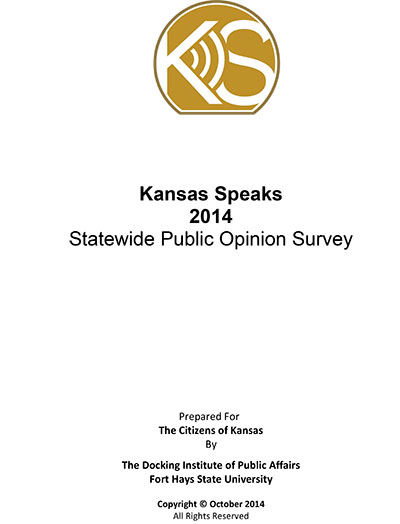Kansas Speaks 2014 comes out Sunday

For more information:
Dr. Gary Brinker
Director, Docking Institute of Public Affairs
785-628-5949
gdbrinker@fhsu.edu
10/17/14 gdb/kb
HAYS, Kan. -- Along with findings that the Kansas governor's race is extremely tight, the sixth annual Kansas Speaks Survey, prepared by Fort Hays State University's Docking Institute of Public Affairs, finds similar tightness in public perception of the job performance of the two major political parties.
One-third (33 percent) of respondents are satisfied with Gov. Sam Brownback's efforts to improve the Kansas economy, and 47 percent were dissatisfied. Satisfaction was higher among the younger and Republican respondents.
Just under one-third (31 percent) of respondents were "very" or "moderately satisfied" with Republican leaders' efforts to improve the Kansas economy, while 43 percent are "very" or "moderately dissatisfied." Dissatisfaction was higher among the older and Democratic respondents.
Democrats do not fare much better: 33 percent are "very" or "moderately satisfied" with Democratic leaders' efforts to improve the Kansas economy, while 37 percent were "very" or "moderately dissatisfied." The rating was higher among Democrats and respondents of Hispanic ethnicity.
Between Sept. 10 and Sept. 27, 952 random adult residents of Kansas were contacted by telephone and asked a series of questions to measure their opinions of elected officials and preferences for public policies. The response rate was 53.6 percent. Of these 952 respondents, 685 said that they voted in the 2012 election. The margin of error for these estimates is plus or minus 3.8 percent.
Full results of this year's Kansas Speaks will be released Sunday, Oct. 19, in tabloid inserts in The Hays Daily News, The Wichita Eagle and The Topeka Capital-Journal.
In the perennial question of how they feel about Kansas as a place to live, a strong majority, 85 percent, of respondents say Kansas is at least a "good" place to live, and only 3 percent said it is a "poor" or "very poor" place to live. The rating was higher among Republican respondents and respondents who were Asian or white.
However, while half of respondents, 50 percent, said the Kansas economy is at least in good condition, 61 percent are "very" or "moderately concerned" that economic conditions in Kansas will threaten their families' welfare.
When asked about Kansas government spending only, 29 percent of respondents said that Kansas government spending should be increased, 35 percent said it should be decreased, and 37 percent said it should "remain the same." When asked about Kansas government spending together with taxation, 50 percent of respondents favor "somewhat" or "much lower" taxes and spending, 24 percent favored "somewhat" or "much higher" taxes and spending, and 26 percent favored "no change."
Some other findings in the 2014 survey:
Among those respondents who favored "somewhat" or "much higher" taxes and spending, 74 percent preferred higher income taxes, 49 percent preferred higher sales tax, and 32 percent preferred increasing property taxes.
A huge 97 percent of those favoring higher taxes and spending supported more funding for grades kindergarten through high school (K-12), 82 percent supported more funding for state colleges and universities, and 89 percent supported an increased in funding for social services.
Among those respondents who favored lower taxes and spending, 72 percent preferred an income tax cut, 57 percent preferred a sales tax cut, and 80 percent preferred a property tax cut.
Of those supporting a decrease in taxes and spending, 16 percent support funding cuts for grades K-12, 33 percent support cuts for state colleges and universities, and 17 percent support a funding cut for social services.
Two-thirds (66 percent) of respondents favored increasing taxes on large corporations. The support for increasing taxes was higher among Democrats, Independent voters leaning Democratic and Independent voters.
More than half (58%) of respondents favored "increasing" taxes on top income earners. Republicans and less-educated respondents tended to be more supportive of lower taxes on top income earners. Only 7 percent of respondents favored higher taxes on the middle class.